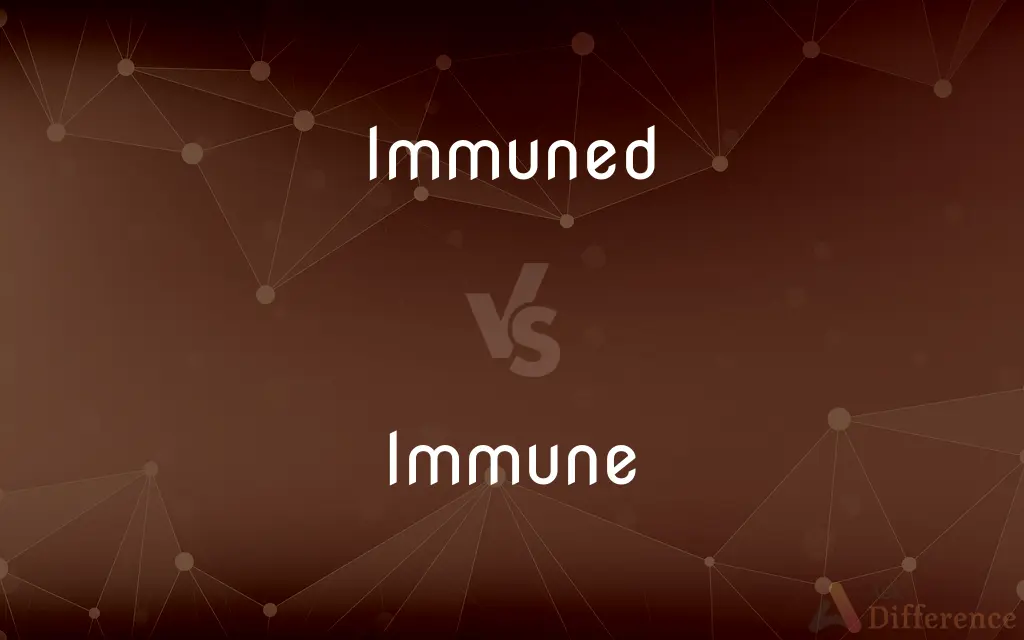Immuned vs. Immune — Which is Correct Spelling?
Edited by Tayyaba Rehman — By Fiza Rafique — Updated on March 19, 2024
"Immuned" is an incorrect spelling. The correct spelling is "immune," which means resistant to a particular infection or toxin due to specific antibodies or sensitized white blood cells.

Table of Contents
Which is correct: Immuned or Immune
How to spell Immune?

Immuned
Incorrect Spelling

Immune
Correct Spelling
ADVERTISEMENT
Key Differences
Think: "I am IMMUNE to the wrong spelling.”
Visualize a shield, representing protection, and link it with the shorter word "immune."
"Immuned" sounds like it has an extra syllable, making it feel longer and redundant.
Remember, there’s no need for an extra "d" at the end of "immune" to represent defense.
Think of the word "moment." "Moment" has one "m" in the middle, just like "immune."
ADVERTISEMENT
How Do You Spell Immune Correctly?
Incorrect: The population became immuned after the vaccination campaign.
Correct: The population became immune after the vaccination campaign.
Incorrect: She is completely immuned to his charm.
Correct: She is completely immune to his charm.
Incorrect: The system was supposed to be immuned to hacking.
Correct: The system was supposed to be immune to hacking.
Incorrect: He thought he was immuned to the cold after living in Alaska.
Correct: He thought he was immune to the cold after living in Alaska.
Incorrect: Plants can become immuned to certain pests over time.
Correct: Plants can become immune to certain pests over time.
Immune Definitions
Resistant to a particular infection due to antibodies.
He's immune to chickenpox after having it as a child.
Not affected by a particular influence.
She seems immune to criticism.
Relating to or involving the immune system.
Immune responses combat diseases.
Not liable to undergo something.
They are immune from prosecution.
A person who is resistant to a particular infection.
As an immune, she didn't catch the flu.
Resistant to a particular infection or toxin owing to the presence of specific antibodies or sensitized white blood cells
They were naturally immune to hepatitis B
Protected or exempt, especially from an obligation or the effects of something
They are immune from legal action
Not subject to an obligation imposed on others; exempt
Immune from being eliminated in a contest.
Having legal immunity
Immune from taxation.
Not affected by a given influence; unresponsive
Immune to persuasion.
Of or relating to immunity or an immune response.
Having resistance to a specific pathogen.
Having or producing sensitized antibodies or lymphocytes that react to specific antigens
Immune serum.
(usually with "from") Exempt; not subject to.
As a diplomat, you are immune from prosecution.
Protected by inoculation, or due to innate resistance to pathogens.
I am immune to chicken pox.
(by extension) Not vulnerable.
Alas, he was immune to my charms.
(medicine) Of or pertaining to the immune system.
We examined the patient's immune response.
(epidemiology) A person who is not susceptible to infection by a particular disease
To make immune.
Exempt; protected.
Protected from disease due to the action of the immune system, especially by having been inoculated against or previously exposed to a disease.
Of or pertaining to the immune system or the components of the immune system.
Not responsive; as, immune to suggestion.
One who is immune; esp., a person who is immune from a disease by reason of previous affection with the disease or inoculation.
A person who is immune to a particular infection
Relating to the condition of immunity;
The immune system
Secure against;
Immune from taxation as long as he resided in Bermuda
Immune from criminal prosecution
Relating to or conferring immunity (to disease or infection)
(usually followed by `to') not affected by a given influence;
Immune to persuasion
Immune Meaning in a Sentence
He is not immune to criticism, despite his confident exterior.
She seems immune to the stress of exams.
After getting the vaccine, he became immune to the virus.
The town was virtually immune to the economic downturn.
The firewall is designed to be immune to standard cyber attacks.
Being immune to common colds doesn't mean you're healthy overall.
Plants developed an immune response to the invasive insect species.
Her immune system is very strong, she rarely gets sick.
The new software update made the system immune to the old glitches.
She wore her immune status bracelet with pride.
The immune response to the vaccine was strong and effective.
The community's herd immunity strategy relied on most members becoming immune.
Some materials are immune to corrosion, making them ideal for outdoor use.
The company claims their encryption is immune to all known hacking techniques.
Immune cells identify and destroy pathogens that enter the body.
The island's unique ecosystem is not immune to climate change.
Immune responses can vary greatly from person to person.
Immune deficiencies can lead to a range of health problems.
Being emotionally immune to negativity helps maintain mental health.
The immune system plays a crucial role in protecting the body from illness.
Psychological resilience can make someone immune to despair.
Certain breeds of dogs are immune to specific genetic disorders.
The vaccine works by making the body immune to the infection.
Regular exercise can boost your immune system.
The village's isolation made it immune to the spread of the disease.
Common Curiosities
Why is it called immune?
It's called "immune" from the Latin word "immunis," meaning exempt or free.
What is the pronunciation of immune?
It is pronounced as i-MYUN.
What is the root word of immune?
The root word is the Latin "immunis."
Which vowel is used before immune?
The vowel "e" is used before immune as in "become immune."
What is the verb form of immune?
Immune is primarily an adjective; there isn’t a direct verb form. However, "immunize" is a related verb.
What is the plural form of immune?
Immune does not have a plural form when used as an adjective. As a noun, "immunes" can refer to a group of people who are resistant.
What is the singular form of immune?
The singular form is "immune."
Which article is used with immune?
Both "an" and "the" can be used depending on context.
Is immune an adverb?
No, immune is not an adverb.
Is immune a vowel or consonant?
"Immune" is a word, not a single letter, so it contains both vowels and consonants.
Is immune a countable noun?
As an adjective, it's not countable. As a noun (referring to resistant individuals), it can be countable.
Which preposition is used with immune?
"To" is commonly used, as in "immune to something."
Which conjunction is used with immune?
Any conjunction can be used with "immune" based on sentence structure, e.g., "and," "but," "or."
What is a stressed syllable in immune?
The stressed syllable is "mune."
What part of speech is immune?
Immune is primarily an adjective.
Which determiner is used with immune?
Determiners like "an," "the," "my," "this" can be used depending on the sentence.
Is immune an abstract noun?
No, immune is not primarily an abstract noun, although the idea of immunity can be abstract.
Is immune a negative or positive word?
Context-dependent. Generally, it is neutral but can be positive in contexts like disease resistance.
How many syllables are in immune?
There are two syllables in "immune."
What is the opposite of immune?
Susceptible.
Is the immune term a metaphor?
The term itself isn't a metaphor, but it can be used metaphorically, e.g., "immune to criticism."
How do we divide immune into syllables?
Im-mune.
What is the first form of immune?
Immune is an adjective and doesn’t have verb forms. The related verb "immunize" has "immunize" as its base form.
What is the third form of immune?
Immune as an adjective doesn’t have a third form. For "immunize," it's "immunized."
Is immune a noun or adjective?
Immune is primarily an adjective but can also be used as a noun.
Is immune a collective noun?
No, it's not a collective noun.
What is another term for immune?
Resistant.
What is the second form of immune?
As an adjective, immune doesn’t have a second form. For "immunize," it's "immunized."
How is immune used in a sentence?
"After receiving the vaccine, she became immune to the disease."
Is the word immune imperative?
No, "immune" is not an imperative verb.
Share Your Discovery

Previous Comparison
Utmost vs. Upmost
Next Comparison
Intail vs. EntailAuthor Spotlight
Written by
Fiza RafiqueFiza Rafique is a skilled content writer at AskDifference.com, where she meticulously refines and enhances written pieces. Drawing from her vast editorial expertise, Fiza ensures clarity, accuracy, and precision in every article. Passionate about language, she continually seeks to elevate the quality of content for readers worldwide.
Edited by
Tayyaba RehmanTayyaba Rehman is a distinguished writer, currently serving as a primary contributor to askdifference.com. As a researcher in semantics and etymology, Tayyaba's passion for the complexity of languages and their distinctions has found a perfect home on the platform. Tayyaba delves into the intricacies of language, distinguishing between commonly confused words and phrases, thereby providing clarity for readers worldwide.














































